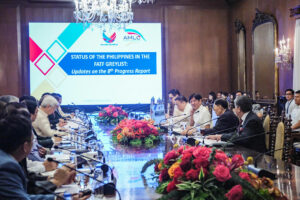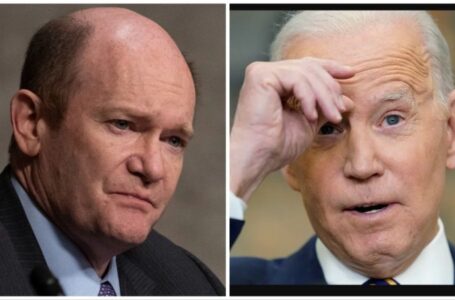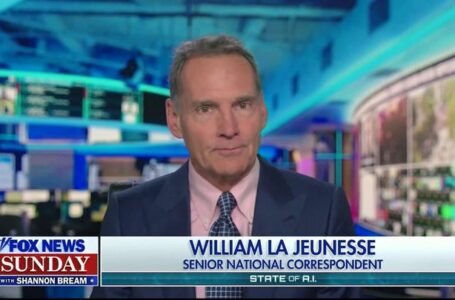‘Ordinary people with shovels’: Volunteers cleaning Black Sea oil spill ask Putin for help
Philippines yet to fulfill some action plans to exit from FATF ‘gray list’


THE PHILIPPINES has yet to fulfill several action plans more than two years since it was placed under the “gray list” of the Financial Action Task Force (FATF), the country’s dirty money watchdog said.
But the Anti-Money Laundering Council (AMLC) is still hoping the Philippines will be able to exit the FATF’s gray list this year, and to avoid a possible inclusion in the blacklist.
At a Palace briefing, AMLC Executive Director Matthew M. David said the Philippines still has to address eight out of the 18 action plan items it had committed to comply with to be removed from the gray list.
“The most challenging action item is regarding terrorism financing prosecution. We need to file more terrorism financing cases and the one in charge of complying with this action item are the law enforcement agencies, including the AMLC,” he said.
Other remaining action plans include the effective risk-based supervision of nonfinancial businesses and professionals, mitigating risk associated with casino junkets, and streamlining access to beneficial ownership information, Mr. David said.
The Philippines has been in the global financial crime watchdog’s gray list of jurisdictions under increased monitoring for dirty money risks since June 2021.
Since the Philippines had failed to meet the FATF’s January 2023 deadline to comply with the action plans, Mr. David said the government has a self-imposed goal of exiting the gray list this month.
“The longer we are on the gray list, the bigger the possibility or the higher the risk that we will enter the blacklist,” he said.
Only three countries are currently in the FATF’s blacklist — North Korea, Iran and Myanmar.
President Ferdinand R. Marcos, Jr. on Tuesday presided over the sectoral meeting on the status of the Philippines in FATF gray list.
“The President also directed the agencies of government to continue with their actions and to continuously sustain good coordination among themselves, between the law enforcement and other government agencies,” Mr. David said.
Enrico P. Villanueva, who teaches banking at the University of the Philippines Los Baños, said banks have done a lot of work and investments in order to manage risks related to money laundering and terrorism financing. Nonbank entities need to do more to catch up, he noted.
“For banks, improvement can still be made on drilling down customer accounts to the ultimate beneficial owners,” he said, noting that beneficial ownership information should be digitized and accessible to regulators and law enforcement agencies.
For nonbank entities, Mr. Villanueva said the regulator should impose penalties such as monetary fines or suspension of business licenses “to communicate seriousness in enforcement.”
Michael L. Ricafort, chief economist at Rizal Commercial Banking Corp., said the Philippines needs to lift the Bank Secrecy Law to make banking regulations at par with those of its Southeast Asian neighbors.
“It will also help in facilitating the integration of the country’s capital markets into the region,” he said via Messenger chat.
Should the Philippines be blacklisted by FATF, Mr. Ricafort said investments and other fund flows into the Philippines would be affected.
Leonardo A. Lanzona, who teaches economics at the Ateneo de Manila University, called on the government to reverse its policy on offshore gambling.
“A first order of business should be the elimination of offshore gambling which is susceptible to money laundering schemes,” he said. “But of course, this should involve a whole-of-government approach which apparently this government has not done.”
In March 2020, then-senator Franklin M. Drilon flagged that millions of dollars brought into the Philippines between December 2019 and February 2020 might have been laundered through Philippine Offshore Gaming Operators (POGOs), which refer to Chinese gambling companies that offer online gambling services to markets outside the Philippines.
The Marcos administration began a crackdown on many POGOs after a spate of kidnappings that targeted their Chinese workers.
“The President has reiterated the government’s high-level political commitment and directed all government agencies concerned to swiftly address the remaining deficiencies in relation to the gray-listing of the Philippines,” Mr. David said at the Tuesday briefing.
He said investor confidence and even the country’s credit rating may be affected if the Philippines remains on the gray list.
“It may also affect foreign direct investments in the Philippines because if you don’t exit the gray list, they may think that our anti-money laundering, combating terrorism financing system is not adequate enough, or sufficient enough or strong enough,” he added.
Rommel C. Banlaoi, chairman of the Philippine Institute for Peace, Violence, and Terrorism Research, recognized the passage of The Terrorism Financing Prevention and Suppression Act of 2012, which was complemented by a 2020 law that amended the country’s Anti-Terrorism Act of 2001.
The two laws as well as the decline of terrorist threats would be enough for the Philippines to exit from the FATF’s gray list.
The country’s anti-terrorism financing measures should consider the emerging global financial landscape, Chester B. Cabalza, founder of Manila-based International Development and Security Cooperation, said via Messenger chat.
Mr. Cabalza cited the introduction of bitcoins, online transactions, and virtual wallets.
Mr. Villanueva said the action plan items needed to get out of the gray list may be challenging but not impossible.
“They just require bureaucratic or political will. For societies or governments that tolerate wrongdoings, political will may be wanting,” he said. — Kyle Aristophere T. Atienza











